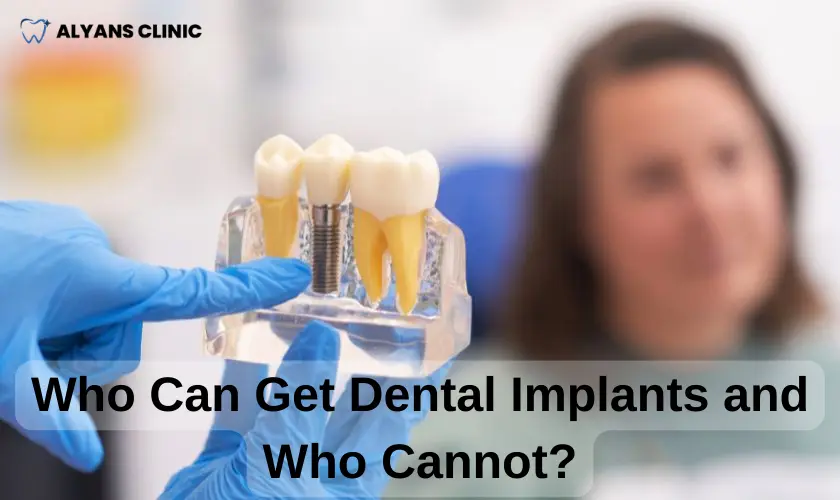
Dental implants are considered one of the most reliable and long-lasting solutions for replacing missing teeth today. However, it is important to know who is suitable for this treatment. In this content, we will examine in detail who is eligible for dental implants and who should avoid this treatment. You will find answers to all your questions about dental implants, suitable candidates, and contraindications. Let’s explore who can get dental implants and who is not suitable for them.
What Are the Health Criteria for Dental Implants?
The first and most important health criterion for being a suitable candidate for dental implants is having good overall oral and dental health. Healthy gums, sufficient bone structure, and the absence of an active infection in the mouth are essential. Adequate bone density is a critical factor for the implant to be firmly anchored in the jawbone. Gum diseases or periodontal diseases can negatively affect the success of the implant. Therefore, individuals considering dental implants should first pay attention to their gum health and, if necessary, undergo periodontal treatment.
General health status is also an important criterion for dental implants. Individuals with chronic conditions such as diabetes, heart diseases, immune system problems, or bleeding disorders should consult their doctors before dental implant treatment. Additionally, smokers are at risk because smoking can slow down the healing process and reduce the success of the implant.
Is Age Important When Getting a Dental Implant?
Age can affect the success and suitability of dental implant treatment. In young individuals, implant placement is not recommended if the jawbone has not yet fully developed. Therefore, dental implants are generally not preferred for individuals under the age of 18, as the jawbone is still in the growth and development phase. Full development of the jawbone is necessary for the implant to be stable and long-lasting.
On the other hand, older individuals can also be suitable candidates for dental implants, but age-related health issues must be considered. In older individuals, decreased bone density or problems related to bone health, such as osteoporosis, can complicate implant treatment. However, older individuals with good general health and sufficient bone density can be successfully treated with dental implants. Age alone is not a barrier; factors such as the individual’s general health status, bone structure, and gum health should be considered when making a decision.
Chronic Diseases That Make Dental Implants Risky
Dental implants are an effective and long-lasting treatment option widely used to replace missing teeth. However, some chronic diseases can make implant treatment risky. These diseases can complicate the healing process and increase the degree of pain after dental implant and the risk of complications after the implant. Below, five chronic diseases that should be considered when getting dental implants are examined: severe osteoporosis, diabetes, heart disease, hypertension, and bleeding disorders.
Severe Osteoporosis
Severe osteoporosis is a disease that causes a significant decrease in bone density. This condition can lead to the jawbone not being strong enough to support the dental implant. In individuals with osteoporosis, the osseointegration process (fusion of the implant with the bone) can be difficult, and the stability of the implant may be compromised.
Diabetes
Uncontrolled diabetes reduces the body’s ability to fight infections and slows down the healing process. In diabetic individuals, the osseointegration process of the implant can be negatively affected, increasing the risk of implant failure. Diabetic patients should ensure their blood sugar levels are under control before undergoing implant treatment.
Heart Disease
Heart diseases can increase the risk of serious complications during and after dental implant surgery. It is crucial for individuals with heart conditions to consult with their cardiologist and take necessary precautions before undergoing any surgical procedures. Heart patients should be aware that they are more vulnerable to surgical stress and potential infections.
Hypertension
High blood pressure (hypertension) can increase the risk of bleeding during surgical procedures and negatively affect the healing process. Hypertensive patients should control their blood pressure and regularly monitor it before undergoing implant surgery.
Bleeding Disorders
Bleeding disorders, such as hemophilia, can lead to serious bleeding risks during and after surgical procedures. Individuals with these conditions should consult their doctors before getting dental implants and take necessary precautions. Special measures may be required for bleeding control.
Necessary Jawbone Density for Implants
The necessary jawbone density and measurements for dental implants are important for the successful placement and longevity of the implant. There should be sufficient bone height and thickness in the area where the implant will be placed.
Typically, it is desired to have at least 1-2 mm of bone tissue around the implant. Bone density directly affects the stability of the implant and the osseointegration process.
Bone density is evaluated in four classes:
- D1 (very dense cortical bone),
- D2 (dense cortical and trabecular bone),
- D3 (less dense cortical and trabecular bone),
- D4 (low-density trabecular bone).
For the implant to be successful, it is ideally preferred to have D1 or D2 type bone density, as these types of bone provide a solid attachment for the implant to the jawbone.
Who Can Get Dental Implants?
Dental implants are a reliable and long-lasting solution for replacing missing teeth. However, not everyone may be suitable for this treatment. Here are the criteria for individuals who can get dental implants:
Individuals with Sufficient Jawbone Density
Suitable candidates for dental implants must have sufficient jawbone density. For the implant to be successfully placed and long-lasting, there should be at least 1-2 mm of solid bone tissue around the implant. Individuals with adequate bone height and thickness support the stability of the implant and the osseointegration process, increasing the success of the implant.
Individuals with Good General Health
Individuals with good general health are suitable candidates for dental implants. A good immune system accelerates the healing process and reduces the risk of complications. Individuals without chronic conditions such as diabetes, heart disease, or other chronic disorders and with good general health can achieve more successful results with dental implant treatment.
Individuals with Controlled Chronic Diseases
Individuals with chronic diseases can also get dental implants as long as these diseases are under control. For example, individuals with controlled diabetes, heart disease, or hypertension can benefit from implant treatment by working with their doctors. It is important for these patients to have regular health check-ups before and after implant treatment.
Individuals Meeting Age Criteria
The ideal age range for dental implants is usually 18 years and older. This age marks the period when the growth and development of the jawbone are completed. Older individuals can also undergo dental implant treatment as long as they have sufficient bone density and good general health. Age alone does not constitute a barrier; however, the general health status and bone structure of elderly individuals should be evaluated.
Individuals who meet these criteria can best benefit from dental implant treatment and achieve long-term successful results.
If you’re searching for experienced team to dental implant in Turkey and questioning about dental implant Turkey prices you can contact us.


